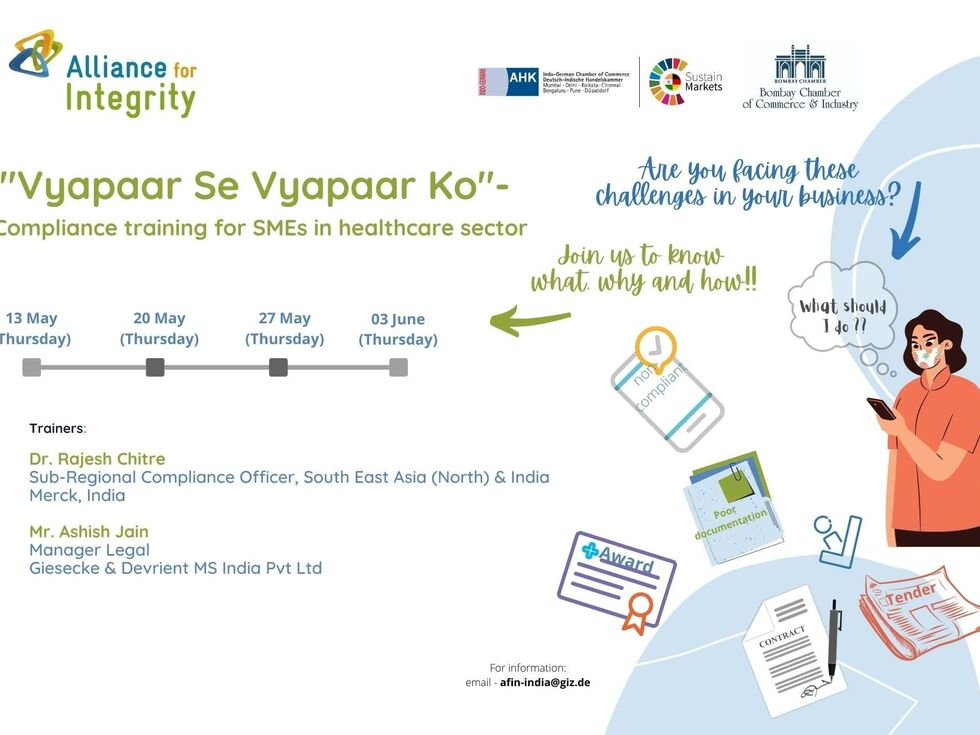Strengthening Integrity and Transparency in the Indian Healthcare Sector
03.06.2021
India, online

The Covid-19 pandemic has put the health sector in the public eye. Companies were under high pressure to provide solutions to the health crisis, allocate limited resources and make the right decisions quickly in order to save lives. This has opened doors for corruption. In India, for example, there were reports of much-needed oxygen concentrators and medicines being sold on the black market at horrendous prices. The economic interest of a few, however, must not come at the expense of all. Transparency, integrity and accountability in the health sector mean much more than just good business practices, they mean preserving public health. Against this background, the Alliance for Integrity, together with leading compliance experts in the field, has adapted the VSVK (Vyapaar se Vyapaar ko – from Businesses to Businesses) corruption prevention training programme to the specific needs of small and medium-sized enterprises (SMEs) operating in the Indian healthcare sector.
Within the four digital training modules, the participants learnt about the different facets of corruption, which grey areas exist and how they can identify red flags at an early stage. Building on this background knowledge, the two trainers Dr Rajesh Chitre, Sub-Regional Compliance Officer South East Asia (North) & India at Merck Group, and Mr. Ashish Jain, Legal, Secretarial, Compliance and Privacy Officer at Giesecke & Devrient MS India Pvt. Ltd., explained how to build an effective compliance management system and mitigate potential risk factors. The question of what needs to be considered when interacting with third parties was particularly highlighted. Ashish Jain explained that companies should implement a detailed policy that regulates the interaction with agents and partners, especially with regard to internal processes and transactions.
The VSVK training programme follows a very practical approach. Concrete case studies that are close to business reality illustrate the theoretical background. In interactive role plays, participants learn how to react in dilemma situations. They are encouraged to actively ask questions, share their experiences and talk about the challenges they face when it comes to corruption.
“The practical approach is one of the main success factors of the training programme. I am now much more aware of potential pitfalls and feel well prepared to continue our path towards integrity”, stated Nishaant Nair from BDH Industries Ltd, one of the participants.
A central component of the training programme are the awareness raising videos for the healthcare sector, which were developed by the Trainers' Working Group Asia. In three episodes, viewers are shown how corrupt business practices in the healthcare sector directly affect peoples’ health. Topics that are addressed in the videos are responsible promotion, medical equipment and tender process. Especially the video on responsible promotion led to a lively discussion as the gift culture is widespread and well-accepted in India. Dr Rajesh Chitre suggested to implement a clear gift policy that regulates the financial value and the conditions under which gifts are allowed to be accepted.
The sector-specific training programme was well received among the participants. “Often it is not the will that is lacking, but the necessary knowledge. We need these kinds of trainings to learn how to put compliance into practice”, stated Imam Ansari, participant of the training. Ms. Wanda Fernandes added that the training helped her to better fulfil her leadership role. “I will demonstrate zero tolerance for corruption and encourage my colleagues to do the same,” she confirmed.
The corruption prevention training for the healthcare sector also met with a very positive response in Argentina, Brazil and Ghana, where the programme had already been implemented. The experiences in the four countries show that a sector-specific approach enhances the impact of the trainings and should be pursued in the future.
Author: Seema Choudhary





